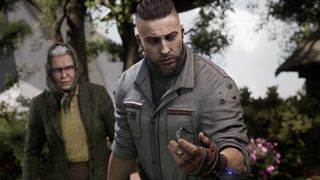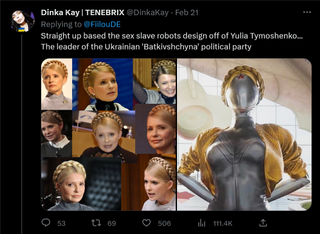Ukraine wants Valve, Microsoft, and Sony to stop selling Atomic Heart in the country
The Ministry of Digital Transformation confirms it will ask Valve, Sony, and Microsoft to halt sales of the Russian-made game in Ukraine.

Ukraine's Ministry of Digital Transformation says it will ask Valve, Microsoft, and Sony to halt the sale of Atomic Heart in Ukraine, and will urge "limiting" its distribution in other countries because of the "the potential use of money raised from game purchases to conduct a war against Ukraine."
Atomic Heart is developed by Mundfish, a Russian studio with alleged ties to the Russian government. It's a complex issue, but the short version is that Mundfish is backed by a company founded by a former deputy general of Gazprom, Russia's state-run energy behemoth, and distributed by VKPlay, which is effectively controlled by Gazprom.
There are other, less concrete connections and claims, but the bottom line, as Joshua Wolens explained in our overview of the controversy, is that "it seems unlikely that no money earned by Mundfish and its investors from Atomic Heart's sales will end up in the pockets of the Russian state, if only by taxation on whatever interests they still have in the country." Atomic Heart is also full of Soviet kitsch, and the lead character is a literal KGB agent, which doesn't sit well with everyone, although Rich Stanton said in our review that the game critiques Russian exceptionalism
Ukraine's decision to request that sales of Atomic Heart be suspended was first reported by Dev.ua (Google translated) and was confirmed today in an English-language statement sent to PC Gamer.
"The Ministry of Digital Transformation of Ukraine will send an official letter to Sony, Microsoft, and Valve requesting a ban on selling digital versions of this game in Ukraine," deputy minister of digital transformation Alex Bornyakov said. "We also urge limiting the distribution of this game in other countries due to its toxicity, potential data collection of users, and the potential use of money raised from game purchases to conduct a war against Ukraine.
"According to media reports, the game's development was funded by Russian enterprises and banks sanctioned and have systemic importance to the Russian government. Therefore, we call for all users worldwide to avoid this game. We also want to emphasize that the game developers have not publicly condemned the Putin regime and the bloody war that Russia has unleashed against Ukraine."
That's true: Mundfish has described itself as "a pro-peace organization against violence against people," but it has not spoken out against Russia's invasion of Ukraine. What's less clear is the reason for its silence on that front: Russia is not particularly well-known for tolerating dissent, and even if Mundfish doesn't actually support the war, it's not hard to imagine that criticism of the regime could lead to a loss of funding and the dissolution of the company.
The biggest gaming news, reviews and hardware deals
Keep up to date with the most important stories and the best deals, as picked by the PC Gamer team.
Guys, we have noted the questions surrounding where we, at Mundfish, stand. We want to assure you that Mundfish is a developer and studio with a global team focused on an innovative game and is undeniably a pro-peace organization against violence against people.January 16, 2023
Bornyakov said the ministry was prompted to call for the ban by "a public request from the Ukrainian gaming community," and that it could ask for proscriptions of other Russian-made games if they're found to have comparable connections to the Russian government.
"If similar facts are observed in relation to other games, we will react to this situation," Bornyakov said.
Atomic Heart has been largely well-received critically—we called it "a beautiful, flawed, and deeply weird Soviet Westworld" in our 78% review—but it's also been roundly criticized for a number of issues beyond its possible support of the Russian government: One of the Soviet-era cartoons seen in the game features a racist caricature, and some observers have said that the highly sexualized robot twins in the game are based on Yulia Tymoshenko, the leader of Ukraine's pro-Western Batkivshchyna party. Others say that the hairstyle is common throughout central Europe, however, and not unique to Tymoshenko.

In January, Mundfish also denied that it was harvesting data for the Russian government, an allegation made following the discovery of a clause in its digital store terms of service saying that user data could be collected and submitted to Russian state authorities including the tax office and the Federal Security Service (FSB), the successor to the KGB. Mundfish told GamesRadar that the data cited in the report was "outdated and wrong," however, and that neither the website nor the game actually collect any user data.
The Ministry of Digital Transformation didn't say when it will issue the call to halt sales of Atomic Heart in Ukraine, and so far there's been no public comment from Valve, Sony, or Microsoft on the request. I've reached out to all three for more information and will update if I receive a reply.
Andy has been gaming on PCs from the very beginning, starting as a youngster with text adventures and primitive action games on a cassette-based TRS80. From there he graduated to the glory days of Sierra Online adventures and Microprose sims, ran a local BBS, learned how to build PCs, and developed a longstanding love of RPGs, immersive sims, and shooters. He began writing videogame news in 2007 for The Escapist and somehow managed to avoid getting fired until 2014, when he joined the storied ranks of PC Gamer. He covers all aspects of the industry, from new game announcements and patch notes to legal disputes, Twitch beefs, esports, and Henry Cavill. Lots of Henry Cavill.
Most Popular







